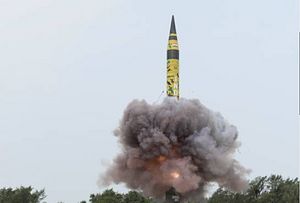India’s minister of defense, Rajnath Singh, has suggested that the country’s longstanding pledge not to use nuclear first may come under review should “circumstances” in the future demand so.
Speaking at Pokhran, where India had detonated weaponized nuclear devices in 1998, Singh said “Till today, our nuclear policy is ‘no first use’.” He added: “What happens in future depends on the circumstances.”
His comments did not represent any changes to India’s nuclear doctrine, but presented the possibility of future changes.
After his speech in Pokhran, Singh also issued a tweet: “Pokhran is the area which witnessed Atal Ji’s firm resolve to make India a nuclear power, and yet, remain firmly committed to the doctrine of ‘No First Use’. India has strictly adhered to this doctrine. What happens in future depends on the circumstances.” (‘Atal Ji’ is a reference to Atal Behari Vajpayee, India’s prime minister at the time of nuclear breakout in 1998.)
In 2014, the Bharatiya Janata Party, the currently dominant national party in India, included a promise in its election manifesto to review India’s nuclear doctrine.
While the 2014 document promised to “revise, update India’s nuclear doctrine,” this pledge was dropped in the party’s 2019 manifesto, released earlier this year.
India’s pledge, called ‘no first use’, was codified in India’s 2003 nuclear doctrine. Following a pledge for India’s nuclear weapons to be used as a “credible minimum deterrent,” the 2003 doctrine continued on to no first use.
“A posture of ‘No First Use’: nuclear weapons will only be used in retaliation against a nuclear attack on Indian territory or on Indian forces anywhere,” the document noted.
Later in the doctrine, a caveat is added: “In the event of a major attack against India, or Indian forces anywhere, by biological or chemical weapons, India will retain the option of retaliating with nuclear weapons.”
India’s 1999 draft nuclear doctrine, published a little more than one year after it broke out along with Pakistan in a series of May 1998 nuclear tests, noted that “no-first use of nuclear weapons is India’s basic commitment.”
“The fundamental purpose of Indian nuclear weapons is to deter the use and threat of use of nuclear weapons by any State or entity against India, and its forces. India will not be the first to initiate a nuclear strike, but will respond with punitive retaliation should deterrence fail,” the 1999 doctrine states.
The draft doctrine had added that “every effort shall be made to persuade other States possessing nuclear weapons to join an international treaty banning first use.”
India, along with China, which has maintained a ‘no first use’ pledge since 1964, is one of just two nuclear powers that maintain such a pledge. Other countries have not ruled out the first use of nuclear weapons.

































